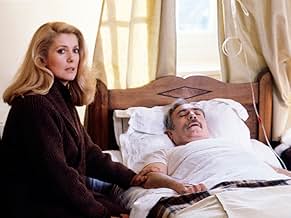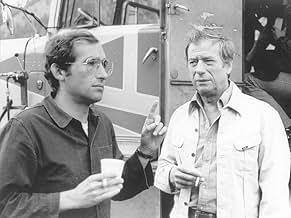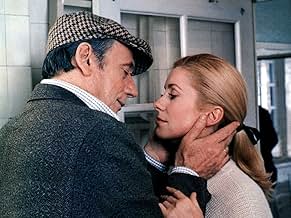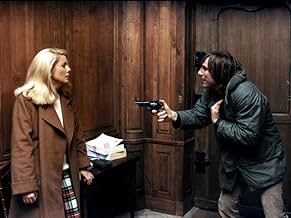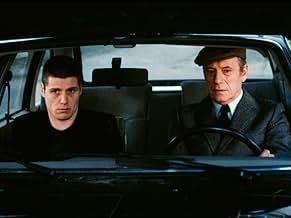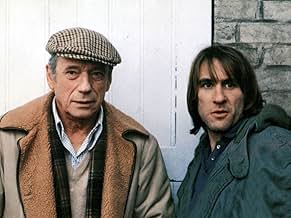CALIFICACIÓN DE IMDb
6.9/10
2.2 k
TU CALIFICACIÓN
Agrega una trama en tu idiomaThe powerful story of a reformed underworld kingpin whose stable lifestyle is turned upside-down when a desperate, escaped killer hides out at his rural estate.The powerful story of a reformed underworld kingpin whose stable lifestyle is turned upside-down when a desperate, escaped killer hides out at his rural estate.The powerful story of a reformed underworld kingpin whose stable lifestyle is turned upside-down when a desperate, escaped killer hides out at his rural estate.
- Dirección
- Guionistas
- Elenco
- Dirección
- Guionistas
- Todo el elenco y el equipo
- Producción, taquilla y más en IMDbPro
Opiniones destacadas
A gracefully paced and ably directed work featuring highly talented players, including Gerard Depardieu and Catherine Deneuve, along with Yves Montand, LE CHOIX DES ARMES is generally successful as cinematic art, although it must be stressed that it should properly be viewed in its French language format, since the subtitled American release is harshly cut and reveals post-production efforts not at all sympathetic with the original release. An escaped convict and killer, Mickey (Depardieu), chooses to hide from police pursuit upon the lavish estate of former organized crime doyen Noel Durrieux (Montand) and his wife Nicole (Deneuve, with a wonderfully layered interpretation of her rôle), but when detectives come near, Mickey flees to Paris, although he soon returns, bringing about a conflict between two criminal codes after Mickey believes that Durrieux has informed police of the escapee's location. There are carefully fleshed out parts here for numerous characters as the two principal antagonists career toward an inevitable climactic meeting, it becoming increasingly apparent that there are lessons to be learned beyond those of the scenario and they may not be divulged by ancillary figures. Auteur Corneau's metronomic tone mates well with the script's finely balanced, rather spare, dialogue, and with a complex plot not immediately pervious to a viewer, the film benefits from the director's ability to weave a diverse cast of characters into a discriminatory dramatic construction. Deneuve earns acting honours, while Depardieu is highly effective as a sociopath savaged by paranoia yet displaying a wide range of emotional engagement with disparate characters, and Montand is icily persuasive as a "retired" mob leader who is forced to reenter his past in the hope of achieving safety for him and his wife. Following a slowly gaited but logical storyline is difficult with the extensive cutting performed upon the film's U.S. version, that is burdened as well with poor sound transference and largely inferior processing, very unfortunate in this instance of a solidly crafted motion picture that deserves better.
.. of superlatives. This, the last of the three polars that Corneau made top-billing Montand, finds Montand retired from the mob and roughing it with Catherine Deneuve in a large country chateau where they breed thoroughbreds. Such an idyll can't last, natch, so, before you can say 'make my day, punk', enter Depardieu, hothead extaordinaire, on the lam and looking for a soft touch. Eventually we need the obligatory scene in which the ageing gunfighter dusts off the old six-shooter and wastes the wannabee new fastest gun, except, of course, that this isn't a Western but a very sophisticated and hugely enjoyable polar.It doesn't get any better than Montand and Depardieu (who had worked together earlier in Claude Sautet's 'Vincent, Paul, Francois et les autres' and would do so again in 'Jean de Florette') and with Corneau on bullhorn what's not to like. Post-war French policiers/polars are in a class of their own and provided your nose is in good working order the whiff of cordite can be identified at once as generated by Jean Pierre Melville, Alain Corneau, Tavernier, etc. This one is right out of the top drawer and would BE a top drawer on any screen it graced. Go see! Enjoy!
Alain Corneau began as assistant to Costa-Gavras so it is only fitting that as a fully-fledged director he should work with Yves Montand. This fine actor had previously starred in 'Le Cercle Rouge' for Jean-Pierre Melville and of the three policier/polar noirs that Corneau and Montand were to make this last one is the nearest to the Melvillian style, in terms of pacing, atmosphere, its depiction of the criminal 'code' and the wafer thin distinction between the gangsters and the guardians of law and order. This is very much a man's world and a pretty cold and brutal one it is at that.
Montand is Noel, a former underworld figure who has used his ill-gotten gains to finance an extremely comfortable lifestyle as a breeder of thoroughbreds but is obliged by an unexpected train of events to revert to the law of the jungle. On the other side of the coin is the deranged psychopath and prison escapee Mickey of Gérard Depardieu who is humanised only by his love for his child which mirrors Noel's love for Catherine Deneuve as Nicole, his wife. Although their backgrounds and social milieus could not be more strikingly different, both men have more in common than they realise and ultimately(SPOILER COMING) the orphaned child becomes the indissoluble link between them. A further contrast is offered between the old school police chief of Michel Calabru and the intense, trigger-happy, fanatical young inspector of Gérard Lanvin.
This is a well constructed piece with a measured pace that allows the characters to develop and with an utterly riveting second half. It is beautifully shot by Pierre William Glenn, tautly scripted by former critic Michel Grisolia and atmospherically scored by Philippe Sarde.
Nicole is assuredly not the most demanding role that Catherine Deneuve has been called upon to play but the simpatico between her and the magnificent Montand is palpable and helps the film to work. They had earlier worked together on the rom-com 'Le Sauvage'. Likewise there could not be a greater contrast between this and her recent collaboration with Depardieu, 'Le Dernier Metro'. He is larger than life here but always 'true' which is a difficult balance to strike and as usual brings his air of unpredictability. Many have lamented that with maturity he has rather 'let himself go' but when Montand, who worked with him three times, referred to him as 'THE actor of his generation', he wasn't far wrong.
Montand is Noel, a former underworld figure who has used his ill-gotten gains to finance an extremely comfortable lifestyle as a breeder of thoroughbreds but is obliged by an unexpected train of events to revert to the law of the jungle. On the other side of the coin is the deranged psychopath and prison escapee Mickey of Gérard Depardieu who is humanised only by his love for his child which mirrors Noel's love for Catherine Deneuve as Nicole, his wife. Although their backgrounds and social milieus could not be more strikingly different, both men have more in common than they realise and ultimately(SPOILER COMING) the orphaned child becomes the indissoluble link between them. A further contrast is offered between the old school police chief of Michel Calabru and the intense, trigger-happy, fanatical young inspector of Gérard Lanvin.
This is a well constructed piece with a measured pace that allows the characters to develop and with an utterly riveting second half. It is beautifully shot by Pierre William Glenn, tautly scripted by former critic Michel Grisolia and atmospherically scored by Philippe Sarde.
Nicole is assuredly not the most demanding role that Catherine Deneuve has been called upon to play but the simpatico between her and the magnificent Montand is palpable and helps the film to work. They had earlier worked together on the rom-com 'Le Sauvage'. Likewise there could not be a greater contrast between this and her recent collaboration with Depardieu, 'Le Dernier Metro'. He is larger than life here but always 'true' which is a difficult balance to strike and as usual brings his air of unpredictability. Many have lamented that with maturity he has rather 'let himself go' but when Montand, who worked with him three times, referred to him as 'THE actor of his generation', he wasn't far wrong.
... in France, of all places. Believe it or not, they actually showed this film on movie night in St. Martin de Re in southern France. I spent a few months there back in '83 as a temporary guest after an altercation with my book maker.
First of all, Catherine DeNeuve is delicious in this film, as always. Depardieu is superb, playing Mickey Le Dingue with a subtle touch that none of us were expecting. Guards and inmates alike, we cried at the sad parts and cheered on the criminals at the crime parts.
French prisons have gotten a lot of bad publicity of late due to the high suicide rate and the beatings or murders by the guards, and the knife attacks, and that's all true, but underneath the squalor and brutality and physical horror, there's beauty and art, and film and Mickey Le Dingue and Miss Deneuve. It was worth going to prison to see this movie.
First of all, Catherine DeNeuve is delicious in this film, as always. Depardieu is superb, playing Mickey Le Dingue with a subtle touch that none of us were expecting. Guards and inmates alike, we cried at the sad parts and cheered on the criminals at the crime parts.
French prisons have gotten a lot of bad publicity of late due to the high suicide rate and the beatings or murders by the guards, and the knife attacks, and that's all true, but underneath the squalor and brutality and physical horror, there's beauty and art, and film and Mickey Le Dingue and Miss Deneuve. It was worth going to prison to see this movie.
2 prison inmates, Mickey (Gérard Depardieu) and Serge escape from jail. After a trap set by other gangsters that leaves Serge badly injured, the two baddies take refuge to Noël Durieux (Yves Montand), a former gangster who leads a bourgeois life by running a stud farm. After Serge dies from his injuries, Noël has the visit of two cops Sarlat (Gérard Lanvin) and Bonnardot (Michel Galabru) who question him about Mickey and Serge and Noël affirms that he doesn't know anything about them. And things take a darker turn for because he believes Noël betrayed him, Mickey gives him a hard time. Noël has no other choice than to eliminate him.
As the heir of Jean-Pierre Melville and Claude Sautet, Alain Corneau brought to French cinema a crop of very well controlled thrillers in their writing and shooting. "Le Choix Des Armes" is part of this league and a valuable illustration of Corneau's stylish approach of French detective film. Adopting a rather sparse directing and a tight, parallel editing, the filmmaker takes pleasure in introducing the main characters and as the film progresses to deepen their personality. Like the greatest filmmakers, Corneau has his style and his set of themes. Communication is a recurrent theme in his filmography, especially the difficulties and absence of it. We learn that the cute little girl is Mickey's daughter and he had it just before he was jailed. The two cops work with different methods which doesn't make their relationships easy. Mickey and Durieux are caught in a vicious spiral that is the result of a happy misunderstanding: because Mickey thinks that Durieux gave him to the police, Durieux has to come back to his former gangster life to get rid of his protégé. As they obey to their respective emotions, the two men and especially Mickey get embroiled in a ruthless system that dwarfs them and prevents any reconciliation between them. A permanent feature (the infernal system) that affects the main characters in Corneau's previous films like in "Police Python 357" (1976) starring Yves Montand.
This somber story is painstakingly built at all levels from the organization of the scenario to the creation of the sequences. Sometimes, one shot or a few ones are sufficient to Corneau to present us the persona of a character in the film like Dany (a young Richard Anconina)'s dumb wife or the duo of cops between ambitious Sarlat and seasoned, disillusioned Bonnardot. The cast lives up to the demands of the story with Depardieu much better than Montand as impulsive, immature Mickey. Horses in Durieux's domain are an evident symbol. One could also hail scenery discerningly chosen that cement the characters' social position, either it is Noël Durieux's lascivious mansion in the country or Dany's shabby flat in popular suburbs. At that time in 1980-1, rare were the directors who dare to shoot in those high-risk outskirts.
This is excellent stuff and it's well known: it's better not to get bogged down in rut. Otherwise, you'll have nothing to say anymore. Thus, Corneau proved his ability at weaving prime thrillers. His next film, "Fort Saganne" (1984) will go in another cinematographic direction: the epic film.
As the heir of Jean-Pierre Melville and Claude Sautet, Alain Corneau brought to French cinema a crop of very well controlled thrillers in their writing and shooting. "Le Choix Des Armes" is part of this league and a valuable illustration of Corneau's stylish approach of French detective film. Adopting a rather sparse directing and a tight, parallel editing, the filmmaker takes pleasure in introducing the main characters and as the film progresses to deepen their personality. Like the greatest filmmakers, Corneau has his style and his set of themes. Communication is a recurrent theme in his filmography, especially the difficulties and absence of it. We learn that the cute little girl is Mickey's daughter and he had it just before he was jailed. The two cops work with different methods which doesn't make their relationships easy. Mickey and Durieux are caught in a vicious spiral that is the result of a happy misunderstanding: because Mickey thinks that Durieux gave him to the police, Durieux has to come back to his former gangster life to get rid of his protégé. As they obey to their respective emotions, the two men and especially Mickey get embroiled in a ruthless system that dwarfs them and prevents any reconciliation between them. A permanent feature (the infernal system) that affects the main characters in Corneau's previous films like in "Police Python 357" (1976) starring Yves Montand.
This somber story is painstakingly built at all levels from the organization of the scenario to the creation of the sequences. Sometimes, one shot or a few ones are sufficient to Corneau to present us the persona of a character in the film like Dany (a young Richard Anconina)'s dumb wife or the duo of cops between ambitious Sarlat and seasoned, disillusioned Bonnardot. The cast lives up to the demands of the story with Depardieu much better than Montand as impulsive, immature Mickey. Horses in Durieux's domain are an evident symbol. One could also hail scenery discerningly chosen that cement the characters' social position, either it is Noël Durieux's lascivious mansion in the country or Dany's shabby flat in popular suburbs. At that time in 1980-1, rare were the directors who dare to shoot in those high-risk outskirts.
This is excellent stuff and it's well known: it's better not to get bogged down in rut. Otherwise, you'll have nothing to say anymore. Thus, Corneau proved his ability at weaving prime thrillers. His next film, "Fort Saganne" (1984) will go in another cinematographic direction: the epic film.
¿Sabías que…?
- TriviaThe German dubbed 35mm Dolby Stereo prints did have a sound error: parts within each reel were side-reversed, i.e. what was intended to be heard from the left front speaker was actually heard from the right front speaker.
- ConexionesReferenced in Girare Le choix des armes (2007)
Selecciones populares
Inicia sesión para calificar y agrega a la lista de videos para obtener recomendaciones personalizadas
- How long is Choice of Arms?Con tecnología de Alexa
Detalles
- Fecha de lanzamiento
- País de origen
- Idiomas
- También se conoce como
- Choice of Arms
- Locaciones de filmación
- La Courneuve, Seine-Saint-Denis, Francia(apartment complex)
- Productoras
- Ver más créditos de la compañía en IMDbPro
Contribuir a esta página
Sugiere una edición o agrega el contenido que falta

Principales brechas de datos
By what name was La decisión de las armas (1981) officially released in Canada in English?
Responda
